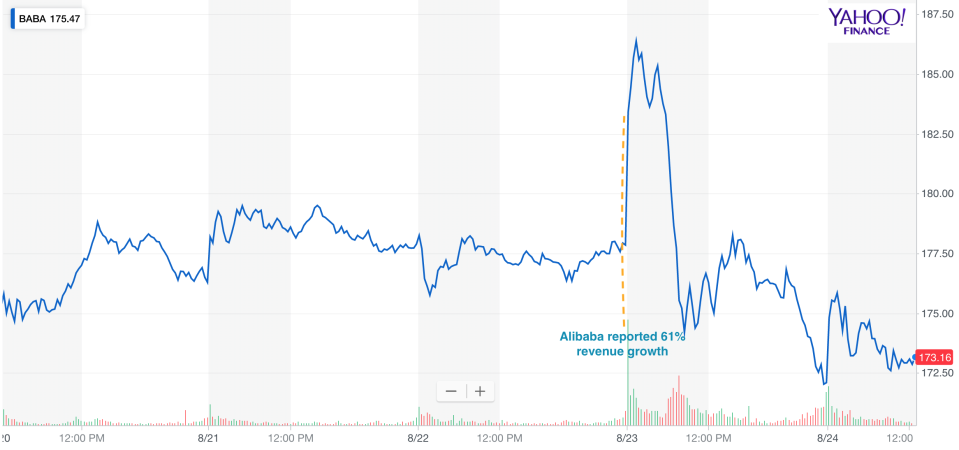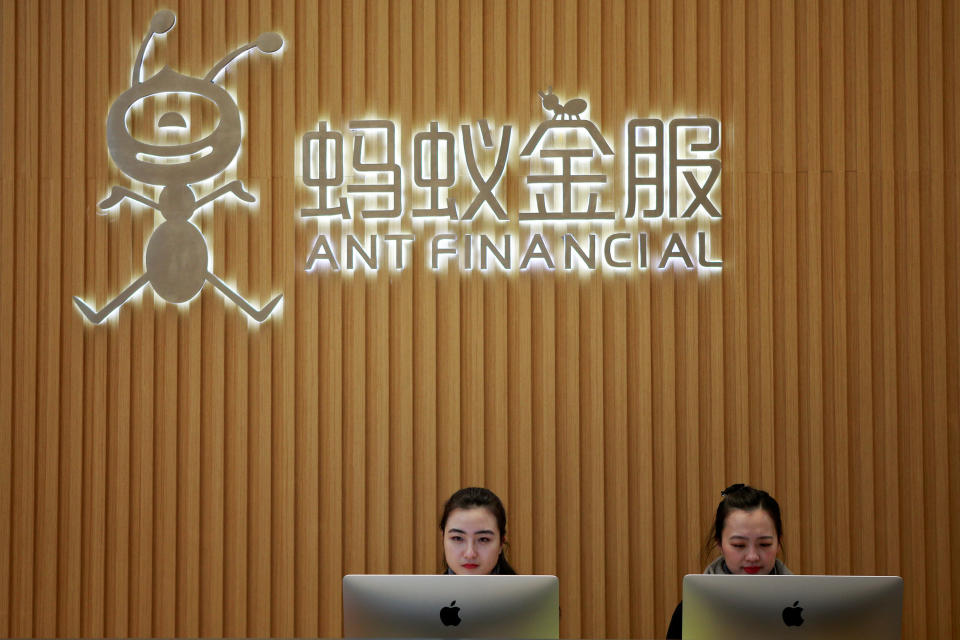Why a 61% revenue growth is not enough for Alibaba investors
Alibaba reported a 61% revenue growth for the quarter ending June 30. That growth rate was higher than all the peers in the BAT (Baidu, Tencent) and FANG (Facebook, Amazon, Netflix and Alphabet‘s Google).
The results haven’t eased investors’ concerns as they read beyond the top line. Alibaba shares (BABA) soared 4% following the earnings announcement, but closed Thursday down 3.2%. The trading volume at 79 million shares was nearly four times higher than usual.
Continued investments squeeze margins
Alibaba isn’t just about selling and buying goods anymore. Much like what Amazon is doing in the U.S., the e-commerce giant has expanded to many other areas. It owns the streaming website Youku (China’s YouTube), local services platform Koubei (similar to Yelp), and food delivery platform Ele.me (like Seamless).
Alibaba CEO Daniel Zhang said it commits to investing heavily in entertainment and local services to capture the needs of the growing middle class in China. While the idea of keeping digital fluent Chinese customers within the Alibaba ecosystem sounds appealing, the impact of money-losing businesses within the ecosystem will have on the company’s bottom line remains uncertain. One thing we know for sure: Building such an ecosystem is a long-lasting effort, which requires a lot of upfront investments and will likely squeeze the company’s margin for a while.

With heavy investment strategy across new retail, International, digital content, cloud, Alibaba’s operating margin dropped to 27.6% from 34.9%, even netting out the expense on Ant Financial, according to a Bloomberg analysis. In the past quarter, Youku’s live streaming rights for the FIFA World Cup in China cost Alibaba RMB1.6 billion ($234 million), which the company said has generated higher traffic. Other investments in digital content included marketing and bandwidth fees.
The consolidation of Alibaba’s local services is not cheap, either. With Softbank’s investment, Alibaba has raised $3 billion to consolidate Koubei and Ele.me, as it scaled up investments in promotion and infrastructure. Meanwhile, the pressure from other local tech titans is still on. Competition from Chinese internet giant Tencent could turn into a cash burn battle for Alibaba in its effort to gain market share.
Also, as a proxy of the world’s second-largest economy, Alibaba’s stock performance is also closely tied to the macroeconomy sentiment and the valuation of its local currency. The yuan’s sharp depreciation against the U.S. dollar this year has resulted in a foreign exchange loss for Alibaba. On Thursday, the exchange rate also caused some confusion over Alibaba’s earnings results — whether its non-GAAP results had beaten estimates or not depends on which currency you’re using, according to a MarketWatch report.
Ant Financial IPO requires a longer wait

Alibaba’s net profit plummeted 41% this quarter to 8.7 billion RMB ($1.3 billion). CFO Maggie Wu attributes this to the RMB 11 billion share-based compensation issued at the latest round of Ant Financial’s financing. The company’s operating income would have been up by 9% if it wasn’t for that expense.
Ant Financial is likely to continue to be a big expense for Alibaba until it goes public. “We expect that our share-based compensation expense related to these awards will continue to be affected by future increases in the valuation of Ant Financial,” Wu told investors on Thursday.
Ant Financial, Alibaba’s fintech affiliate, is one of the most valuable unicorns in the world, with a valuation of $150 billion in its last private fundraising in June. Alibaba had taken up an option to acquire one-third of Ant Financial last quarter, a move that was widely seen to pave the way for one of the biggest ever IPO.
Now the road to an IPO seems bumpier. Sources recently told The Financial Times that it’s unlikely before the end of 2019. Ant’s quarterly profit has dropped more than half in a prolonged battle with Tencent and Chinese regulator’s crackdown on non-traditional financial institutions.
Whether it’s Alibaba’s efforts to establish an ecosystem or Ant Financial’s looming IPO, Alibaba stock performance looks like a test of patience for investors.
Send your thoughts/questions to krystalh@yahoofinance.com or follow her on Twitter.
Read more:
The real reason why traders are shorting Alibaba
How Apple succeeded in China, where other tech giants have failed
Inside Amazon’s little-known graphic T-shirt-making business

 Yahoo Finance
Yahoo Finance 
